

SWB looks at satisfaction generally, as well as a sense of satisfaction to that particular person’s standard.
« Accepting your experience of life as being great and wonderful is the single greatest thing you can do for your happiness. » Mark Manson. The Dark Side of Happiness: Can We Have Too Much of a Good Thing?
One of Aesop’s most quoted lines goes, “It is possible to have too much of a good thing.”
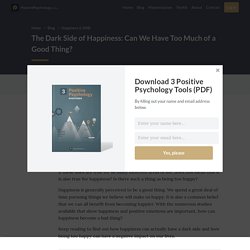
Another version of this line states “too much of a good thing is a bad thing”. We have all used these lines at one point in our lives. We also know how true these are for almost everything, may it be food, money, leisure, or work. What is Happiness and Why is It Important? (+ Definition in Psychology) The Philosophy of Happiness in Life (+ Aristotle's View) Home » Happiness & SWB » The Philosophy of Happiness in Life (+ Aristotle’s View) Last Updated on February 8, 2019 Photo by Gades Photography on Unsplash Happiness.
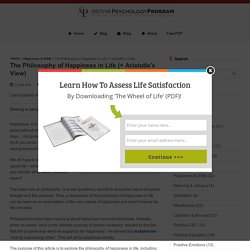
It is a term we throw about without much thought these days… my guess is that, actually, you think you know what is meant by saying someone is happy. We all hope to be happy and live a ‘good life’– whatever that means! The basic role of ‘philosophy’ is to ask questions, and think about the nature of human thought and the universe. Philosophers have been inquiring about happiness since ancient times.
Happiness and Life Satisfaction. First published in 2013; substantive revision May 2017.
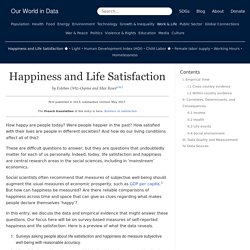
The French translation of this entry is here: Bonheur et satisfaction How happy are people today? Were people happier in the past? How satisfied with their lives are people in different societies? Life Satisfaction Theory and 4 Contributing Factors (Incl. SWLS Scale) Subjective Well-Being. Self-Verification. Science of Happiness. Happiness Quest.
Unhappiness. Acceptance. Inner Peace. Joy. 5 Practices for Nurturing Happiness by Thich Nhat Hanh. Photo © Unified Buddhist Church.
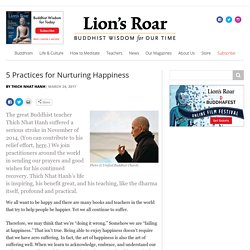
The great Buddhist teacher Thich Nhat Hanh suffered a serious stroke in November of 2014. (You can contribute to his relief effort, here.) We join practitioners around the world in sending our prayers and good wishes for his continued recovery. Thich Nhat Hanh’s life is inspiring, his benefit great, and his teaching, like the dharma itself, profound and practical.
We all want to be happy and there are many books and teachers in the world that try to help people be happier. Therefore, we may think that we’re “doing it wrong.” How to be Happy: Is There a Secret Key to Finding True Happiness? The Wheel of Life: Assess Life Satisfaction With this Free Tool (PDF) Yes, please send me this tool Economists typically adopt the view that well-being depends on external life circumstances, and that it can be influenced by simply altering these conditions.
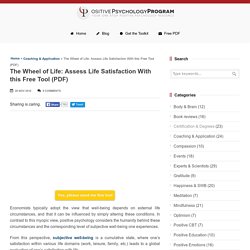
In contrast to this myopic view, positive psychology considers the humanity behind these circumstances and the corresponding level of subjective well-being one experiences. From this perspective, subjective well-being is a cumulative state, where one’s satisfaction within various life domains (work, leisure, family, etc.) leads to a global evaluation of one’s satisfaction with life. This, taken in conjunction with high positive affect and low negative affect, lead to an overall perception of how well one perceives oneself or in other words one’s evaluation of subjective well-being (Diener, 2000). 4 Rituals That Will Make You Happy.
A Comprehensive Guide on How to be Happy. We all want to be happy, don’t we?

But what does happiness even mean, and are there really ways of cultivating it? The good people at prestigious Ivy League college, Yale, certainly seem to think so. They have made their most popular course ever, The Science of Well-Being, which was devised by Professor Laurie Santos, available online for free. Happiness. Happy Thoughts. 19 Cliché Quotes on Happiness and Do They Hold True? Last Updated on March 13, 2019 Photo by Rawpixel from Pexels You don’t have to look very far to find some of the many, many quotes on happiness that exist. But do you ever wonder how these quotes hold up when you consider the evidence? There’s nothing wrong with getting a quick mood boost from a quote—no matter how “accurate” it is—but if you’re like this author you always have the urge to dig a little deeper and see whether these statements hold water. In this piece, we’ll do just that!
There are few among us that haven’t found solace, encouragement, motivation, inspiration, or validation from a spot-on quote. As a reminder, it’s fine to love a quote and continue to draw strength from it even if it’s not 100% in line with current research findings; this exercise is meant to provide an opportunity to familiarize yourself with the literature on happiness and perhaps think a little more critically when you receive cliché or trite advice on how to be happy. Björk - Violently Happy.